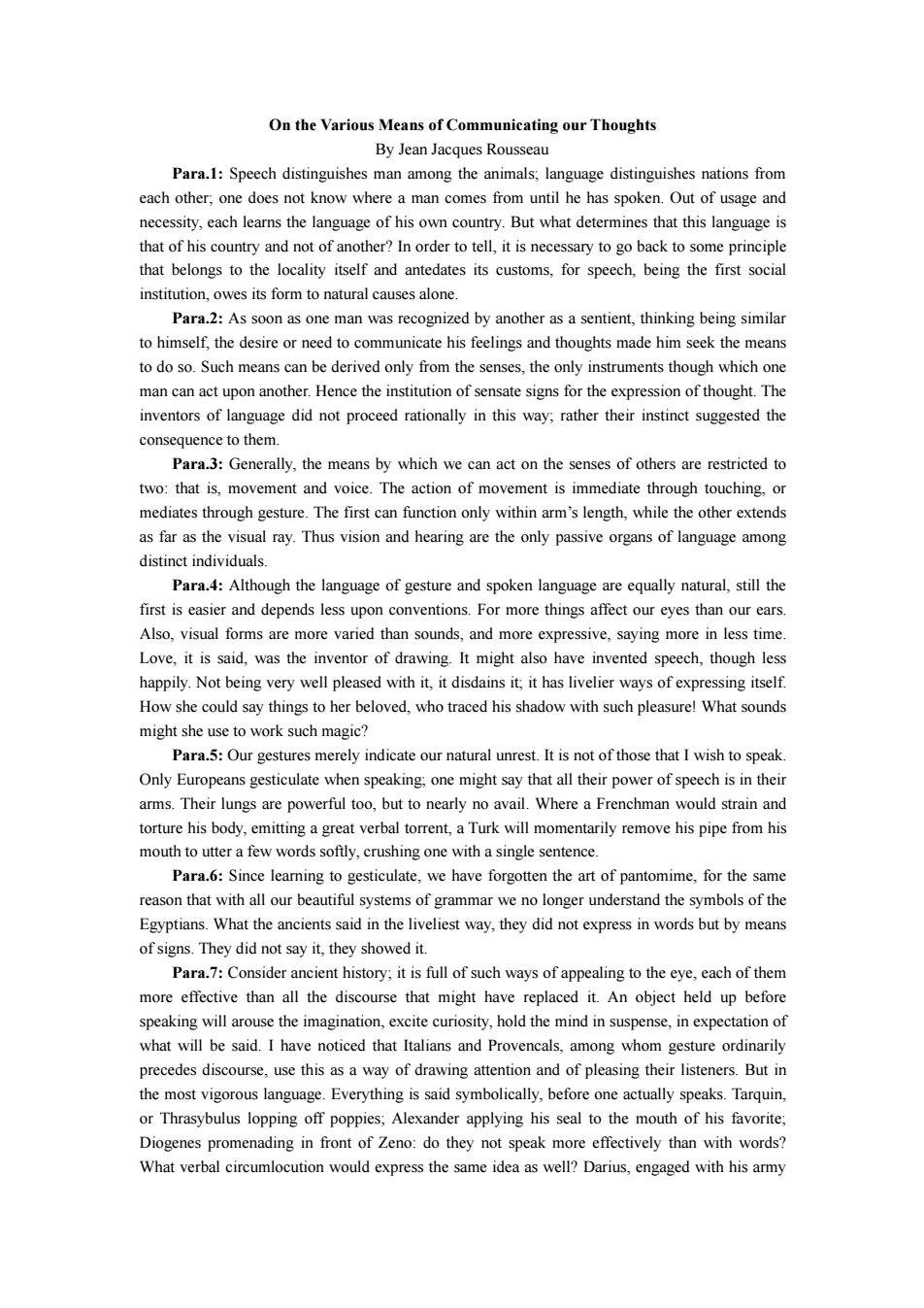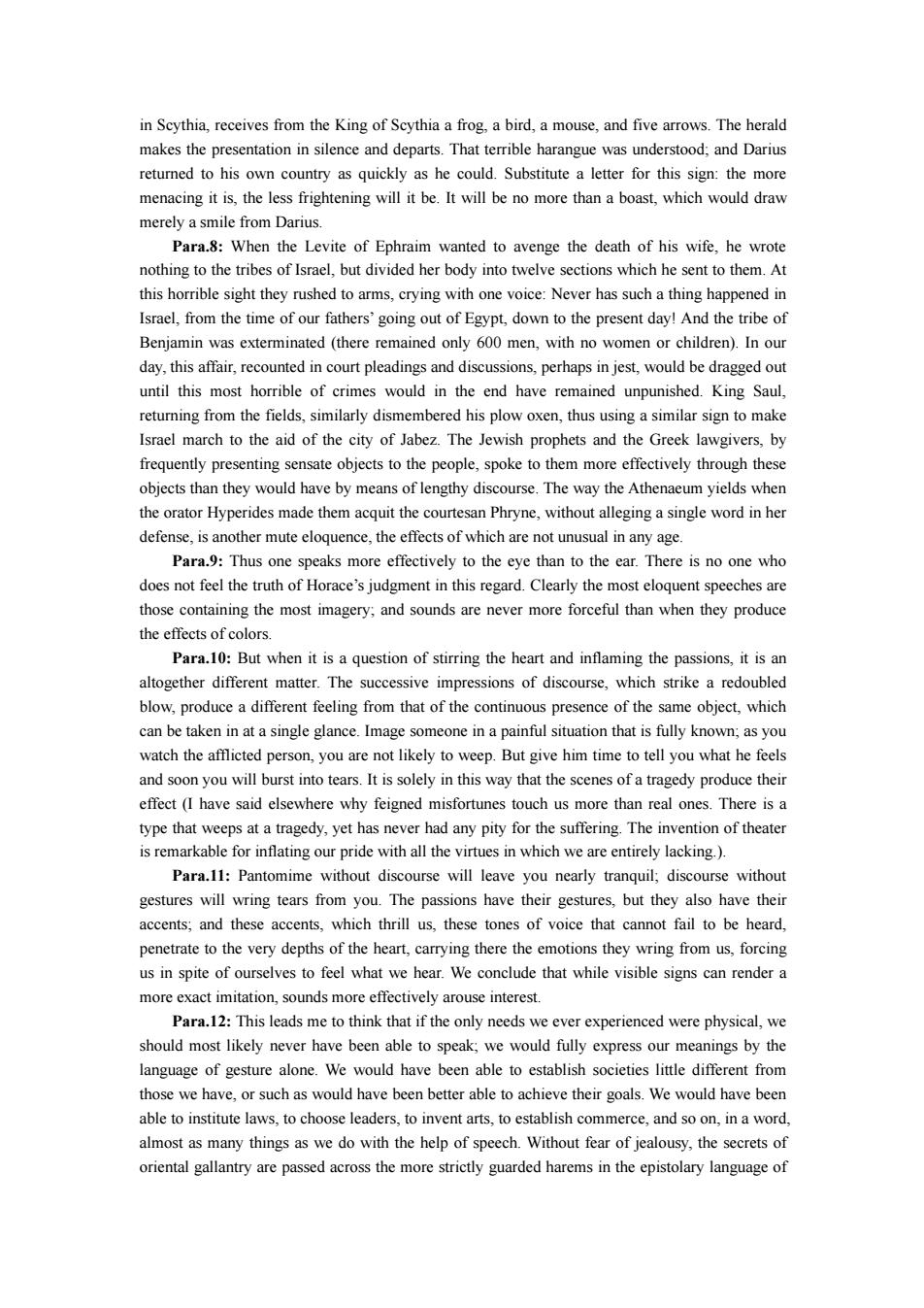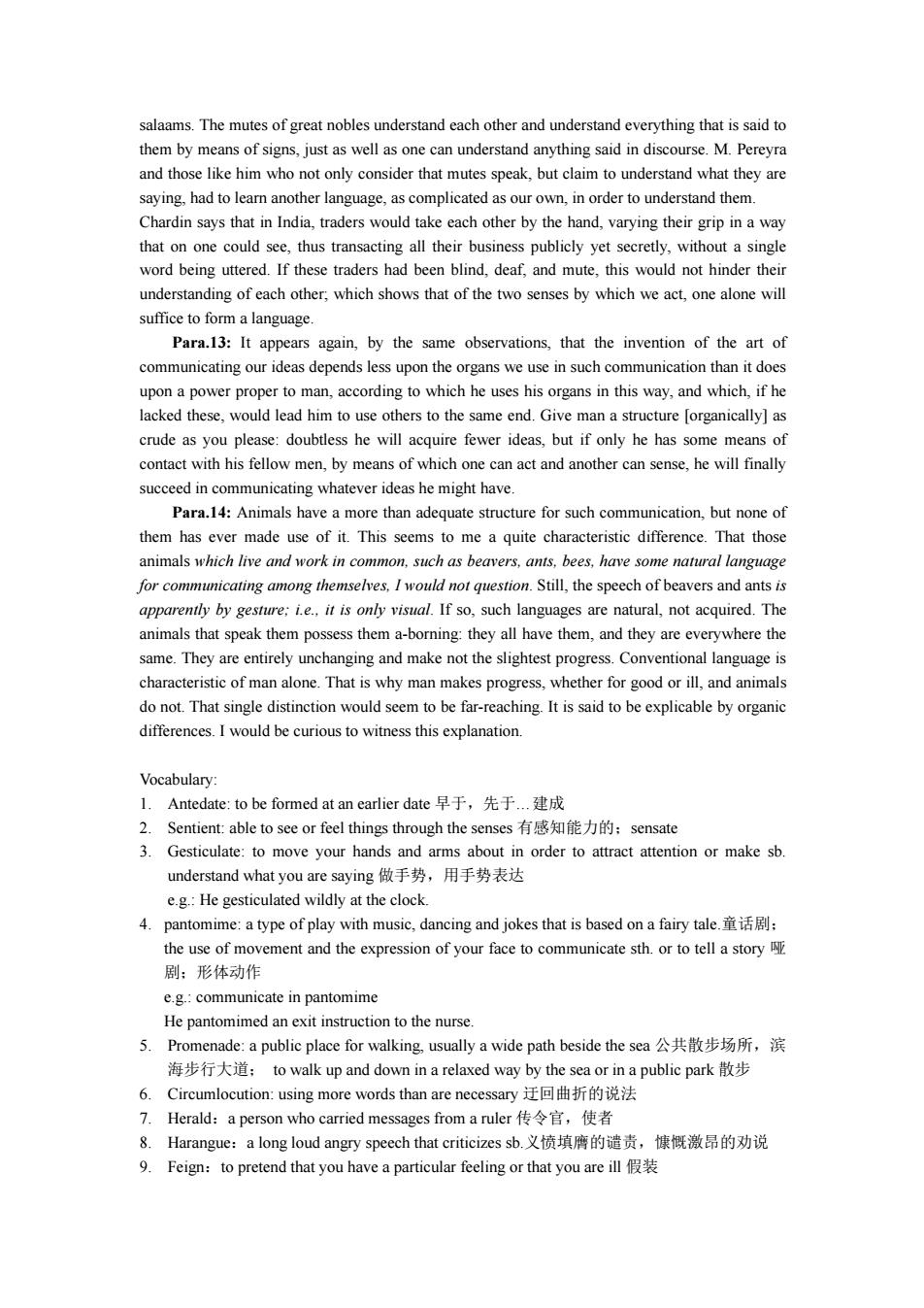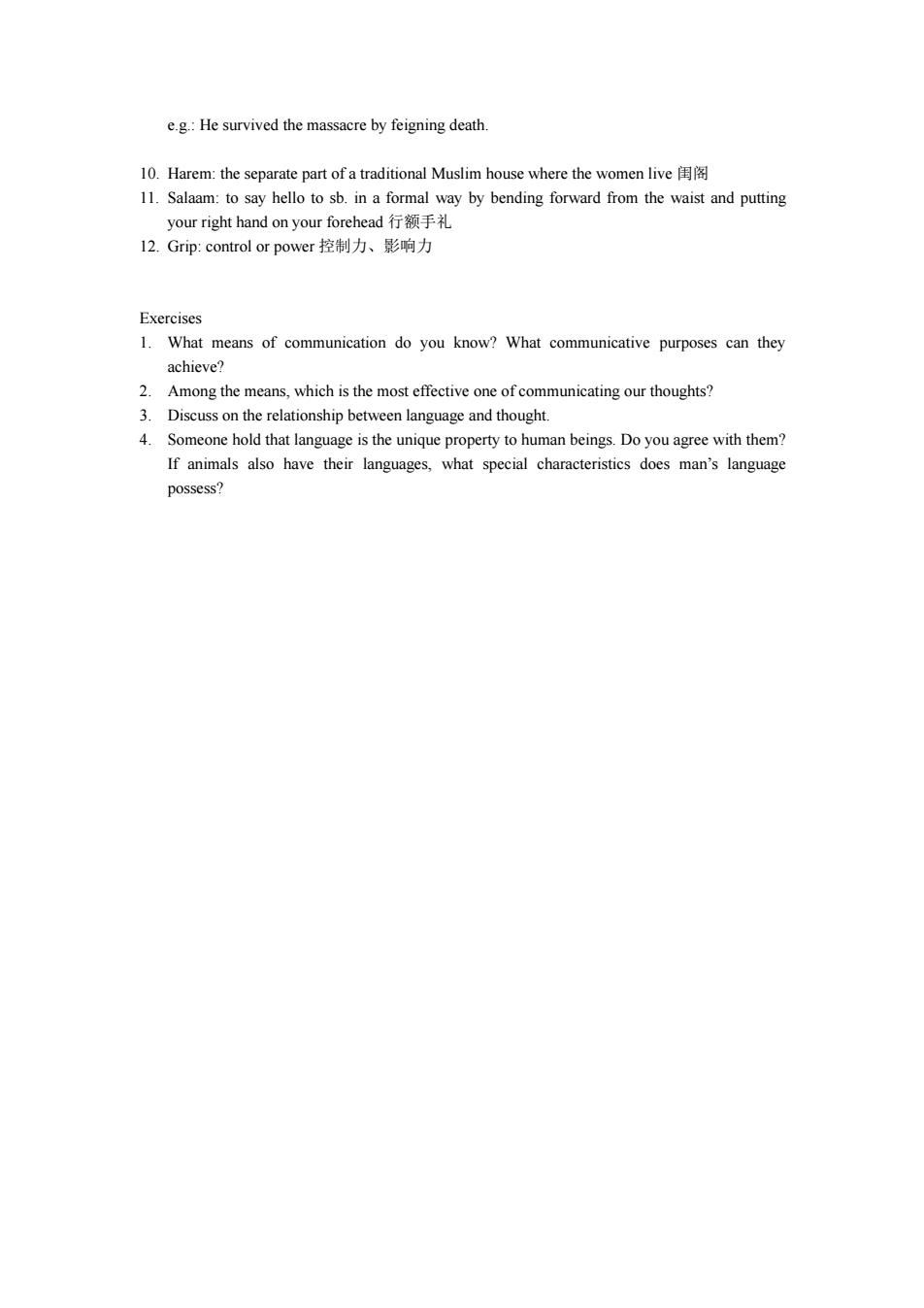
On the Various Means of Communicating our Thoughts By Jean Jacques Rousseau Para.1:Speech distinguishes man among the animals;language distinguishes nations from each other:one does not know where a man comes from until he has spoken.Out of usage and necessity,each learns the language of his own country.But what determines that this language is that of his country and not of another?In order to tell,it is necessary to go back to some principle that belongs to the locality itself and antedates its customs,for speech,being the first social institution,owes its form to natural causes alone. Para.2:As soon as one man was recognized by another as a sentient,thinking being similar to himself,the desire or need to communicate his feelings and thoughts made him seek the means to do so.Such means can be derived only from the senses,the only instruments though which one man can act upon another.Hence the institution of sensate signs for the expression of thought.The inventors of language did not proceed rationally in this way;rather their instinct suggested the consequence to them. Para.3:Generally,the means by which we can act on the senses of others are restricted to two:that is,movement and voice.The action of movement is immediate through touching,or mediates through gesture.The first can function only within arm's length,while the other extends as far as the visual ray.Thus vision and hearing are the only passive organs of language among distinct individuals. Para.4:Although the language of gesture and spoken language are equally natural,still the first is easier and depends less upon conventions.For more things affect our eyes than our ears. Also,visual forms are more varied than sounds,and more expressive,saying more in less time. Love,it is said,was the inventor of drawing.It might also have invented speech,though less happily.Not being very well pleased with it,it disdains it,it has livelier ways of expressing itself. How she could say things to her beloved,who traced his shadow with such pleasure!What sounds might she use to work such magic? Para.5:Our gestures merely indicate our natural unrest.It is not of those that I wish to speak. Only Europeans gesticulate when speaking,one might say that all their power of speech is in their arms.Their lungs are powerful too,but to nearly no avail.Where a Frenchman would strain and torture his body,emitting a great verbal torrent,a Turk will momentarily remove his pipe from his mouth to utter a few words softly,crushing one with a single sentence. Para.6:Since learning to gesticulate,we have forgotten the art of pantomime,for the same reason that with all our beautiful systems of grammar we no longer understand the symbols of the Egyptians.What the ancients said in the liveliest way,they did not express in words but by means of signs.They did not say it,they showed it. Para.7:Consider ancient history;it is full of such ways of appealing to the eye,each of them more effective than all the discourse that might have replaced it.An object held up before speaking will arouse the imagination,excite curiosity,hold the mind in suspense,in expectation of what will be said.I have noticed that Italians and Provencals,among whom gesture ordinarily precedes discourse,use this as a way of drawing attention and of pleasing their listeners.But in the most vigorous language.Everything is said symbolically,before one actually speaks.Tarquin, or Thrasybulus lopping off poppies;Alexander applying his seal to the mouth of his favorite; Diogenes promenading in front of Zeno:do they not speak more effectively than with words? What verbal circumlocution would express the same idea as well?Darius,engaged with his army
On the Various Means of Communicating our Thoughts By Jean Jacques Rousseau Para.1: Speech distinguishes man among the animals; language distinguishes nations from each other; one does not know where a man comes from until he has spoken. Out of usage and necessity, each learns the language of his own country. But what determines that this language is that of his country and not of another? In order to tell, it is necessary to go back to some principle that belongs to the locality itself and antedates its customs, for speech, being the first social institution, owes its form to natural causes alone. Para.2: As soon as one man was recognized by another as a sentient, thinking being similar to himself, the desire or need to communicate his feelings and thoughts made him seek the means to do so. Such means can be derived only from the senses, the only instruments though which one man can act upon another. Hence the institution of sensate signs for the expression of thought. The inventors of language did not proceed rationally in this way; rather their instinct suggested the consequence to them. Para.3: Generally, the means by which we can act on the senses of others are restricted to two: that is, movement and voice. The action of movement is immediate through touching, or mediates through gesture. The first can function only within arm’s length, while the other extends as far as the visual ray. Thus vision and hearing are the only passive organs of language among distinct individuals. Para.4: Although the language of gesture and spoken language are equally natural, still the first is easier and depends less upon conventions. For more things affect our eyes than our ears. Also, visual forms are more varied than sounds, and more expressive, saying more in less time. Love, it is said, was the inventor of drawing. It might also have invented speech, though less happily. Not being very well pleased with it, it disdains it; it has livelier ways of expressing itself. How she could say things to her beloved, who traced his shadow with such pleasure! What sounds might she use to work such magic? Para.5: Our gestures merely indicate our natural unrest. It is not of those that I wish to speak. Only Europeans gesticulate when speaking; one might say that all their power of speech is in their arms. Their lungs are powerful too, but to nearly no avail. Where a Frenchman would strain and torture his body, emitting a great verbal torrent, a Turk will momentarily remove his pipe from his mouth to utter a few words softly, crushing one with a single sentence. Para.6: Since learning to gesticulate, we have forgotten the art of pantomime, for the same reason that with all our beautiful systems of grammar we no longer understand the symbols of the Egyptians. What the ancients said in the liveliest way, they did not express in words but by means of signs. They did not say it, they showed it. Para.7: Consider ancient history; it is full of such ways of appealing to the eye, each of them more effective than all the discourse that might have replaced it. An object held up before speaking will arouse the imagination, excite curiosity, hold the mind in suspense, in expectation of what will be said. I have noticed that Italians and Provencals, among whom gesture ordinarily precedes discourse, use this as a way of drawing attention and of pleasing their listeners. But in the most vigorous language. Everything is said symbolically, before one actually speaks. Tarquin, or Thrasybulus lopping off poppies; Alexander applying his seal to the mouth of his favorite; Diogenes promenading in front of Zeno: do they not speak more effectively than with words? What verbal circumlocution would express the same idea as well? Darius, engaged with his army

in Scythia,receives from the King of Scythia a frog,a bird,a mouse,and five arrows.The herald makes the presentation in silence and departs.That terrible harangue was understood;and Darius returned to his own country as quickly as he could.Substitute a letter for this sign:the more menacing it is,the less frightening will it be.It will be no more than a boast,which would draw merely a smile from Darius. Para.8:When the Levite of Ephraim wanted to avenge the death of his wife,he wrote nothing to the tribes of Israel,but divided her body into twelve sections which he sent to them.At this horrible sight they rushed to arms,crying with one voice:Never has such a thing happened in Israel,from the time of our fathers'going out of Egypt,down to the present day!And the tribe of Benjamin was exterminated (there remained only 600 men,with no women or children).In our day,this affair,recounted in court pleadings and discussions,perhaps in jest,would be dragged out until this most horrible of crimes would in the end have remained unpunished.King Saul, returning from the fields,similarly dismembered his plow oxen,thus using a similar sign to make Israel march to the aid of the city of Jabez.The Jewish prophets and the Greek lawgivers,by frequently presenting sensate objects to the people,spoke to them more effectively through these objects than they would have by means of lengthy discourse.The way the Athenaeum yields when the orator Hyperides made them acquit the courtesan Phryne,without alleging a single word in her defense,is another mute eloquence,the effects of which are not unusual in any age. Para.9:Thus one speaks more effectively to the eye than to the ear.There is no one who does not feel the truth of Horace's judgment in this regard.Clearly the most eloquent speeches are those containing the most imagery;and sounds are never more forceful than when they produce the effects of colors. Para.10:But when it is a question of stirring the heart and inflaming the passions,it is an altogether different matter.The successive impressions of discourse,which strike a redoubled blow,produce a different feeling from that of the continuous presence of the same object,which can be taken in at a single glance.Image someone in a painful situation that is fully known;as you watch the afflicted person,you are not likely to weep.But give him time to tell you what he feels and soon you will burst into tears.It is solely in this way that the scenes of a tragedy produce their effect(I have said elsewhere why feigned misfortunes touch us more than real ones.There is a type that weeps at a tragedy,yet has never had any pity for the suffering.The invention of theater is remarkable for inflating our pride with all the virtues in which we are entirely lacking.). Para.11:Pantomime without discourse will leave you nearly tranquil;discourse without gestures will wring tears from you.The passions have their gestures,but they also have their accents;and these accents,which thrill us,these tones of voice that cannot fail to be heard, penetrate to the very depths of the heart,carrying there the emotions they wring from us,forcing us in spite of ourselves to feel what we hear.We conclude that while visible signs can render a more exact imitation,sounds more effectively arouse interest. Para.12:This leads me to think that if the only needs we ever experienced were physical,we should most likely never have been able to speak;we would fully express our meanings by the language of gesture alone.We would have been able to establish societies little different from those we have,or such as would have been better able to achieve their goals.We would have been able to institute laws,to choose leaders,to invent arts,to establish commerce,and so on,in a word, almost as many things as we do with the help of speech.Without fear of jealousy,the secrets of oriental gallantry are passed across the more strictly guarded harems in the epistolary language of
in Scythia, receives from the King of Scythia a frog, a bird, a mouse, and five arrows. The herald makes the presentation in silence and departs. That terrible harangue was understood; and Darius returned to his own country as quickly as he could. Substitute a letter for this sign: the more menacing it is, the less frightening will it be. It will be no more than a boast, which would draw merely a smile from Darius. Para.8: When the Levite of Ephraim wanted to avenge the death of his wife, he wrote nothing to the tribes of Israel, but divided her body into twelve sections which he sent to them. At this horrible sight they rushed to arms, crying with one voice: Never has such a thing happened in Israel, from the time of our fathers’ going out of Egypt, down to the present day! And the tribe of Benjamin was exterminated (there remained only 600 men, with no women or children). In our day, this affair, recounted in court pleadings and discussions, perhaps in jest, would be dragged out until this most horrible of crimes would in the end have remained unpunished. King Saul, returning from the fields, similarly dismembered his plow oxen, thus using a similar sign to make Israel march to the aid of the city of Jabez. The Jewish prophets and the Greek lawgivers, by frequently presenting sensate objects to the people, spoke to them more effectively through these objects than they would have by means of lengthy discourse. The way the Athenaeum yields when the orator Hyperides made them acquit the courtesan Phryne, without alleging a single word in her defense, is another mute eloquence, the effects of which are not unusual in any age. Para.9: Thus one speaks more effectively to the eye than to the ear. There is no one who does not feel the truth of Horace’s judgment in this regard. Clearly the most eloquent speeches are those containing the most imagery; and sounds are never more forceful than when they produce the effects of colors. Para.10: But when it is a question of stirring the heart and inflaming the passions, it is an altogether different matter. The successive impressions of discourse, which strike a redoubled blow, produce a different feeling from that of the continuous presence of the same object, which can be taken in at a single glance. Image someone in a painful situation that is fully known; as you watch the afflicted person, you are not likely to weep. But give him time to tell you what he feels and soon you will burst into tears. It is solely in this way that the scenes of a tragedy produce their effect (I have said elsewhere why feigned misfortunes touch us more than real ones. There is a type that weeps at a tragedy, yet has never had any pity for the suffering. The invention of theater is remarkable for inflating our pride with all the virtues in which we are entirely lacking.). Para.11: Pantomime without discourse will leave you nearly tranquil; discourse without gestures will wring tears from you. The passions have their gestures, but they also have their accents; and these accents, which thrill us, these tones of voice that cannot fail to be heard, penetrate to the very depths of the heart, carrying there the emotions they wring from us, forcing us in spite of ourselves to feel what we hear. We conclude that while visible signs can render a more exact imitation, sounds more effectively arouse interest. Para.12: This leads me to think that if the only needs we ever experienced were physical, we should most likely never have been able to speak; we would fully express our meanings by the language of gesture alone. We would have been able to establish societies little different from those we have, or such as would have been better able to achieve their goals. We would have been able to institute laws, to choose leaders, to invent arts, to establish commerce, and so on, in a word, almost as many things as we do with the help of speech. Without fear of jealousy, the secrets of oriental gallantry are passed across the more strictly guarded harems in the epistolary language of

salaams.The mutes of great nobles understand each other and understand everything that is said to them by means of signs,just as well as one can understand anything said in discourse.M.Pereyra and those like him who not only consider that mutes speak,but claim to understand what they are saying,had to learn another language,as complicated as our own,in order to understand them. Chardin says that in India,traders would take each other by the hand,varying their grip in a way that on one could see,thus transacting all their business publicly yet secretly,without a single word being uttered.If these traders had been blind,deaf,and mute,this would not hinder their understanding of each other,which shows that of the two senses by which we act,one alone will suffice to form a language. Para.13:It appears again,by the same observations,that the invention of the art of communicating our ideas depends less upon the organs we use in such communication than it does upon a power proper to man,according to which he uses his organs in this way,and which,if he lacked these,would lead him to use others to the same end.Give man a structure [organically]as crude as you please:doubtless he will acquire fewer ideas,but if only he has some means of contact with his fellow men,by means of which one can act and another can sense,he will finally succeed in communicating whatever ideas he might have. Para.14:Animals have a more than adequate structure for such communication,but none of them has ever made use of it.This seems to me a quite characteristic difference.That those animals which live and work in common,such as beavers,ants,bees,have some natural language for communicating among themselves,I would not question.Still,the speech of beavers and ants is apparently by gesture;i.e.,it is only visual.If so,such languages are natural,not acquired.The animals that speak them possess them a-borning:they all have them,and they are everywhere the same.They are entirely unchanging and make not the slightest progress.Conventional language is characteristic of man alone.That is why man makes progress,whether for good or ill,and animals do not.That single distinction would seem to be far-reaching.It is said to be explicable by organic differences.I would be curious to witness this explanation. Vocabulary: l.Antedate:to be formed at an earlier date早于,先于建成 2.Sentient:able to see or feel things through the senses有感知能力的:sensate 3.Gesticulate:to move your hands and arms about in order to attract attention or make sb. understand what you are saying做手势,用手势表达 e.g.:He gesticulated wildly at the clock. 4.pantomime:a type of play with music,dancing and jokes that is based on a fairy tale..童话剧; the use of movement and the expression of your face to communicate sth.or to tell a story 剧:形体动作 e.g.:communicate in pantomime He pantomimed an exit instruction to the nurse. 5.Promenade:a public place for walking,usually a wide path beside the sea公共散步场所,滨 海步行大道:to walk up and down in a relaxed way by the sea or in a public park散步 6.Circumlocution:using more words than are necessary迂▣曲折的说法 7.Herald:a person who carried messages from a ruler传令官,使者 8.Harangue:a long loud angry speech that criticizes sb.义愤填膺的谴责,慷慨激昂的劝说 9.Feign:to pretend that you have a particular feeling or that you are ill
salaams. The mutes of great nobles understand each other and understand everything that is said to them by means of signs, just as well as one can understand anything said in discourse. M. Pereyra and those like him who not only consider that mutes speak, but claim to understand what they are saying, had to learn another language, as complicated as our own, in order to understand them. Chardin says that in India, traders would take each other by the hand, varying their grip in a way that on one could see, thus transacting all their business publicly yet secretly, without a single word being uttered. If these traders had been blind, deaf, and mute, this would not hinder their understanding of each other; which shows that of the two senses by which we act, one alone will suffice to form a language. Para.13: It appears again, by the same observations, that the invention of the art of communicating our ideas depends less upon the organs we use in such communication than it does upon a power proper to man, according to which he uses his organs in this way, and which, if he lacked these, would lead him to use others to the same end. Give man a structure [organically] as crude as you please: doubtless he will acquire fewer ideas, but if only he has some means of contact with his fellow men, by means of which one can act and another can sense, he will finally succeed in communicating whatever ideas he might have. Para.14: Animals have a more than adequate structure for such communication, but none of them has ever made use of it. This seems to me a quite characteristic difference. That those animals which live and work in common, such as beavers, ants, bees, have some natural language for communicating among themselves, I would not question. Still, the speech of beavers and ants is apparently by gesture; i.e., it is only visual. If so, such languages are natural, not acquired. The animals that speak them possess them a-borning: they all have them, and they are everywhere the same. They are entirely unchanging and make not the slightest progress. Conventional language is characteristic of man alone. That is why man makes progress, whether for good or ill, and animals do not. That single distinction would seem to be far-reaching. It is said to be explicable by organic differences. I would be curious to witness this explanation. Vocabulary: 1. Antedate: to be formed at an earlier date 早于,先于…建成 2. Sentient: able to see or feel things through the senses 有感知能力的;sensate 3. Gesticulate: to move your hands and arms about in order to attract attention or make sb. understand what you are saying 做手势,用手势表达 e.g.: He gesticulated wildly at the clock. 4. pantomime: a type of play with music, dancing and jokes that is based on a fairy tale.童话剧; the use of movement and the expression of your face to communicate sth. or to tell a story 哑 剧;形体动作 e.g.: communicate in pantomime He pantomimed an exit instruction to the nurse. 5. Promenade: a public place for walking, usually a wide path beside the sea 公共散步场所,滨 海步行大道; to walk up and down in a relaxed way by the sea or in a public park 散步 6. Circumlocution: using more words than are necessary 迂回曲折的说法 7. Herald:a person who carried messages from a ruler 传令官,使者 8. Harangue:a long loud angry speech that criticizes sb.义愤填膺的谴责,慷慨激昂的劝说 9. Feign:to pretend that you have a particular feeling or that you are ill 假装

e.g.:He survived the massacre by feigning death. 10.Harem:the separate part of a traditional Muslim house where the women live 11.Salaam:to say hello to sb.in a formal way by bending forward from the waist and putting your right hand on your forehead行额手礼 l2.Grip:control or power控制力、影响力 Exercises 1.What means of communication do you know?What communicative purposes can they achieve? 2.Among the means,which is the most effective one of communicating our thoughts? 3.Discuss on the relationship between language and thought. 4.Someone hold that language is the unique property to human beings.Do you agree with them? If animals also have their languages,what special characteristics does man's language possess?
e.g.: He survived the massacre by feigning death. 10. Harem: the separate part of a traditional Muslim house where the women live 闺阁 11. Salaam: to say hello to sb. in a formal way by bending forward from the waist and putting your right hand on your forehead 行额手礼 12. Grip: control or power 控制力、影响力 Exercises 1. What means of communication do you know? What communicative purposes can they achieve? 2. Among the means, which is the most effective one of communicating our thoughts? 3. Discuss on the relationship between language and thought. 4. Someone hold that language is the unique property to human beings. Do you agree with them? If animals also have their languages, what special characteristics does man’s language possess?